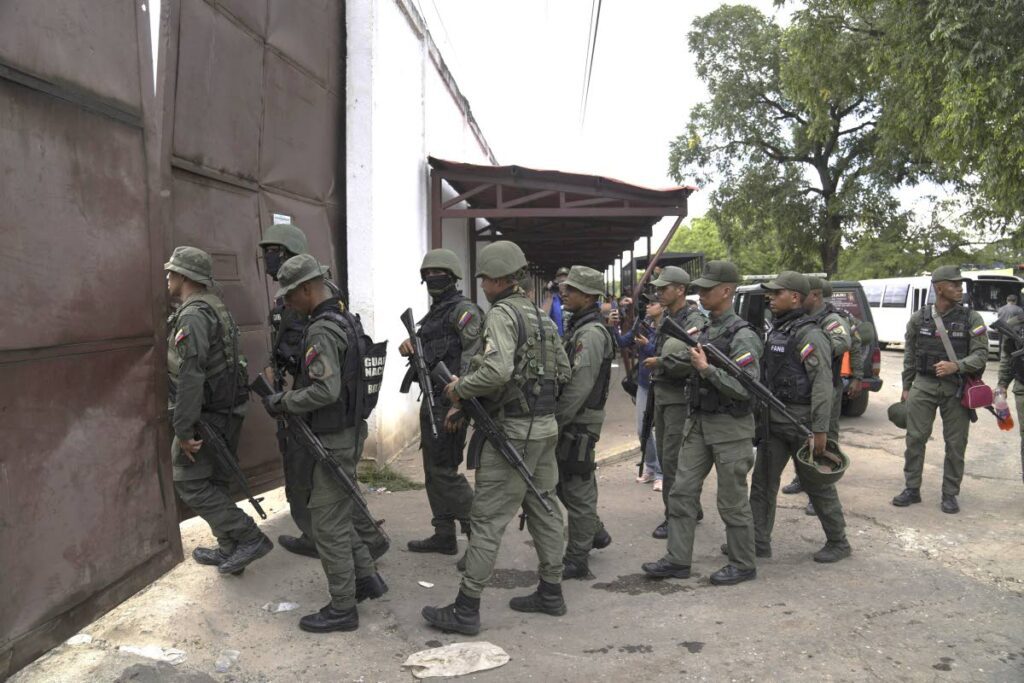Government to adopt US terrorism policy – Trinidad and Tobago targets Venezuelan gang

GOVERNMENT has agreed to adopt the US policy against Venezuelan gang, Tren De Aragua, the prime minister announced on March 27 at the post-cabinet media conference at Whitehall in Port of Spain.
Addressing the media at the conference, mere hours after he returned home from Jamaica, Stuart Young said government had given the commitment to identifying the gang as a terrorist organisation, during his bilateral meeting with US Secretary of State Marco Rubio on March 26 in Kingston.
“We are committed to that,” he said.
“I have already spoken to our attorney general (Camille Robinson-Regis) about it and it gave me the opportunity to raise it frontally with the secretary of state and to ask him if he has evidence that is going to help us, to provide it. He immediately turned to the support team and told them to get it to Trinidad and Tobago.”
Young said while government has no evidence of the operation of that gang in TT, it will take the necessary legal steps to identify that gang as a terrorist organisation. This would include going to court with evidence of the gang’s activities in this country.
Young said despite the lack of evidence, government will take a proactive approach to identifying the gang.
“You see it (the declaration) often in newspapers and from time to time the AG has gone to court and gotten orders to declare a person a terrorist. (We decided) let us take the pre-emptive strike so that if they arrive here we already have the power in place to deal with them differently.”
TREN DE ARAGUA
According to international media reports, the Tren De Aragua traces its origins to an infamously lawless prison in the central state of Aragua in Venezuela. The gang originated more than a decade ago and has expanded in recent years as more than 7.7 million Venezuelans fled political and economic turmoil under the Maduro regime.

The gang has been identified in parts of the US and Latin America including Peru and Colombia.
In one of his first acts as US president, Donald Trump declared the Tren de Aragua a terrorist organisation, invoked the 1798 Alien Enemies Act – which allows the president to deport any non-US citizen during war time – and declared the gang an "invading force."
On March 15, more than 200 Venezuelan migrants were deported from the US under allegations of being part of that criminal organisation. However, the White House provided no evidence of migrants' alleged membership.
The Venezuelan government refused to accept the deportees. According to reports, the 200 Venezuelans are now detained in a maximum security gang prison in El Salvador, where the US government will pay annually for their incarceration.
MIGRANTS CAN'T VOTE
At the press conference, Young also rubbished claims that Venezuelan migrants were being registered by the Elections and Boundaries Commission (EBC) so they could vote for the PNM in the April 28 general election.
“In the past couple days, it has come to my attention that they are trying to start a conversation that by some stretch of the imagination, the EBC and government are registering Venezuelans to participate in the election. That is completely false.
“I stand here today to say, please ignore this intentionally misleading, fake and false information that is being spun from certain quarters that want to interfere with your peace and psyche going into the election.”
Young said a decision was taken on April 17, 2019, when he was minister of national security, that the migrant registration programme and period permitted under that programme would not form part of any calculation of the time required to apply for residency.
“We did this as a humanitarian gesture. The 16,000 Venezuelans registered at that time do not get any rights in law that could be equated to them getting residency. I was very clear at that point in time what the effects of the registration of Venezuelans would be and what rights they would have.”
He said government continues to extend the registration time to continue assisting in a humanitarian manner.
“The policy started in April 2019. That was set for a year initially, as it comes up for expiry, we then take decisions to extend and that is what we have been doing. I don’t want to pre-empt what we are going to do on the next occasion. The Minister of National Security will have to come to the cabinet. We will make a policy decision as to whether we continue it or not."
Young said that while Venezuelan immigrants were not allowed to vote, those who were naturalised through marriage and other situations will be made citizens with all rights and obligations, but that it was still ultimately up to immigration officers whether those who apply for citizenship will be successful.
“What immigration does (for people who get married) is they do their investigation on whether it is or not a marriage of convenience, whether there are children who were born in TT
“Even in those circumstances there is no magic formula. It is up to the immigration officers investigating this particular case. What is clear is whatever time they spent as a migrant under the programme does not count.”

Comments
"Government to adopt US terrorism policy – Trinidad and Tobago targets Venezuelan gang"